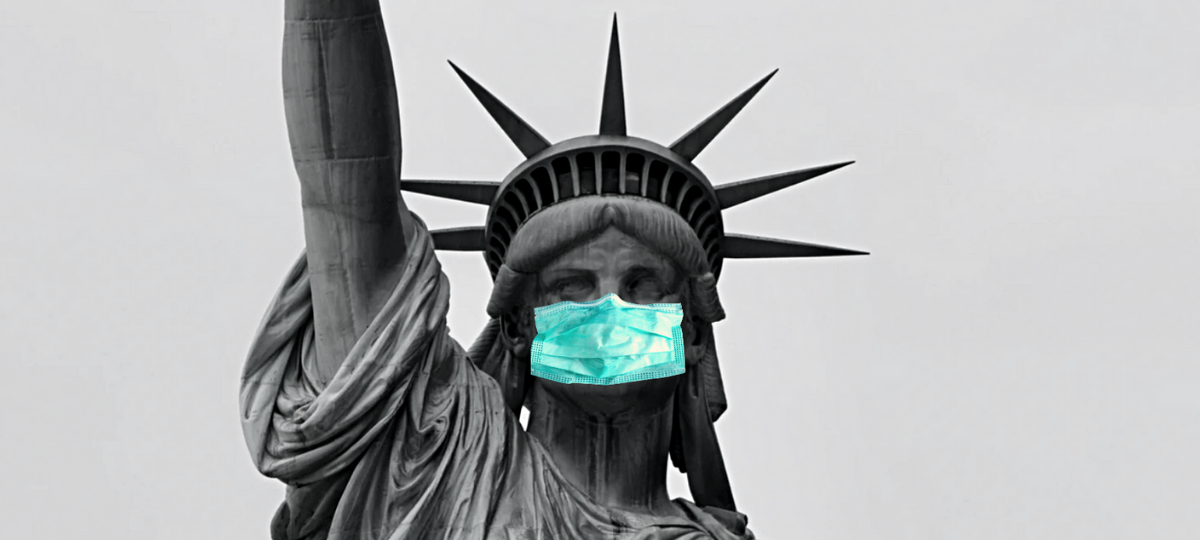The coronavirus has taken the lives of more than 154,000 people. This is profoundly sad and sobering. I sometimes feel we lose sight of this tragedy in the midst of the debate over “reopening” the country.
But I also know governments’ response to the crisis has life and death implications. And we need to be forceful in opposing decisions that would result in even greater harm. Though the fight over the country’s future isn’t front-and-center in many Americans’ minds, libertarians need to be prepared to articulate why a freer society is crucial to recovery and the best way to prepare for another pandemic.
Let’s start with economic freedom. It’s an idea that has lifted billions out of poverty and created enormous sums of wealth, enabling us to fight back against the deadly coronavirus. Expanding economic freedom has never been more important. It’s what will accelerate a recovery, but it requires tearing down barriers—high taxes, wasteful spending, burdensome regulations, etc.—that have suppressed wealth creation and denied so many a chance at a better life.
The lesson from the Depression of 1920-21 is instructive. If you’ve never heard of it, that’s probably because it ended so quickly. In response to a sharp economic downturn during the early 20s, the federal government slashed spending and allowed the free market to work. The economy quickly recovered and paved the way for the “Roaring Twenties.” This example demonstrating the power of markets stands in stark contrast to the Great Depression, which was prolonged by government intervention and only ended after the market was allowed to recover from WWII.
Hopefully officials learn from lessons past because governments all across the country are dealing with their own economic and fiscal crises. According to the Committee for a Responsible Federal Budget, the federal budget deficit is projected to be $3.8 trillion this fiscal year. And it’s likely to rise even higher after Congress passes another spending package to aid businesses and states dealing with the coronavirus. For context, the entire federal budget in 2015 was $3.7 trillion.
Had governments done a better job of controlling spending, both the public and private sectors would be in a better position to respond to the pandemic. Instead, the federal government is running historic deficits; the Federal Reserve has engaged in an unprecedented expansion of lending; and, state and local officials are begging for bailouts.
This crisis should not be used to prop up irresponsible governments and lock in entrenched bureaucracies. Governments and other independent agencies should respond to these challenges by reducing spending and restructuring operations so they are leaner and in a better position to weather future crises.
Federal officials should consider redirecting current spending to offset the cost of a fourth coronavirus relief package likely to be approved by Congress within the next few weeks. A great place to start looking for spending offsets is the list of recommendations put together by Chris Edwards of the Cato Institute. The federal government should also attach strings to any federal aid, ensuring state and local governments and agencies use the money as a bridge to recovery, not a temporary crutch that enables profligacy.
Finally, we need radical decentralization. The response to health emergencies should not be tied to federal agencies like the Food and Drug Administration or the Centers for Disease Control and Prevention. Top down systems squash innovation, which can lead to deadly repercussions. Permanently relaxing or eliminating restrictions on things like testing and vaccines must be a top priority after the crisis passes.
Another factor hindering a response to the virus is the dependency of states and businesses on the federal government. It’s the product of our collective failure to stop the growth of the leviathan. Washington D.C. has grown its power at the expense of all of us, along with state and local governments. New York is, unfortunately, a good example.
D.C. consistently takes more money from New Yorkers in taxes then it sends back to the state in federal aid. This is problematic for a number of reasons, including limiting what states like New York can do in response to a pandemic. Decentralization mitigates this problem by allowing more resources and power to stay with people in the states rather than concentrating it in D.C. where it is often misused or abused.
Decentralization should also take the form of repealing laws and regulations that artificially restrict the supply of medical services and personnel, leaving decisions about allocating resources to the marketplace instead of government bureaucrats or special interests looking to protect themselves from competition. Empowering the private sector is the best way to save lives.
The road ahead will be difficult. Libertarians are going to have to fight harder than ever to ensure long existing and newly adopted government policies are not part of our new normal.
Our lives and liberty depend on it.





2 comments
… [Trackback]
[…] Find More Info here on that Topic: thelibertarianrepublic.com/what-should-a-post-pandemic-america-look-like/ […]
… [Trackback]
[…] Read More Info here on that Topic: thelibertarianrepublic.com/what-should-a-post-pandemic-america-look-like/ […]